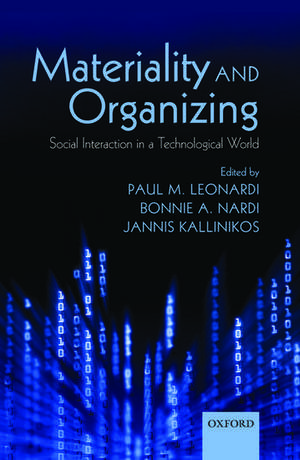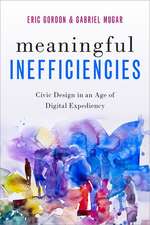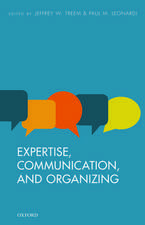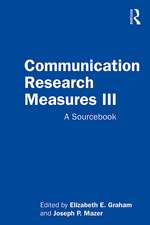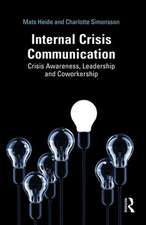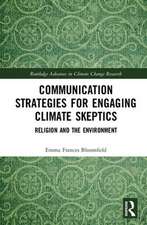Materiality and Organizing: Social Interaction in a Technological World
Editat de Paul M. Leonardi, Bonnie A. Nardi, Jannis Kallinikosen Limba Engleză Paperback – 22 noi 2012
| Toate formatele și edițiile | Preț | Express |
|---|---|---|
| Paperback (1) | 348.11 lei 31-37 zile | |
| Oxford University Press – 22 noi 2012 | 348.11 lei 31-37 zile | |
| Hardback (1) | 923.53 lei 31-37 zile | |
| OUP OXFORD – 22 noi 2012 | 923.53 lei 31-37 zile |
Preț: 348.11 lei
Preț vechi: 403.20 lei
-14% Nou
Puncte Express: 522
Preț estimativ în valută:
66.61€ • 69.73$ • 55.12£
66.61€ • 69.73$ • 55.12£
Carte tipărită la comandă
Livrare economică 26 martie-01 aprilie
Preluare comenzi: 021 569.72.76
Specificații
ISBN-13: 9780199664061
ISBN-10: 0199664064
Pagini: 380
Dimensiuni: 178 x 234 x 21 mm
Greutate: 0.58 kg
Editura: Oxford University Press
Colecția OUP Oxford
Locul publicării:Oxford, United Kingdom
ISBN-10: 0199664064
Pagini: 380
Dimensiuni: 178 x 234 x 21 mm
Greutate: 0.58 kg
Editura: Oxford University Press
Colecția OUP Oxford
Locul publicării:Oxford, United Kingdom
Recenzii
Materiality and Organizing marks a long overdue turning point in the scholarly study of the human-technology relationship that now engulfs our lives. For too long, researchers have tended to treat technology as a dream conjured by agents and imbued with their projects. This brilliant sequence of essays restores and deepens the entire field of perception. It finally returns us to the facticity of technology as it persistently redefines the horizon of the possible. These tightly argued masterpieces reestablish technology as embodied and significant. Most importantly, they return us to materiality just in time. With each passing day, technology becomes both more abstracted from its physical manifestations and more ubiquitous, producing a dematerialized materiality. Only a relentless focus on this paradox will yield the intellectual tools that are required to participate in our own destinies.
This volume is a much-needed exploration of the material aspects of the technologies that have reshaped our world. For two decades, a narrative framing technologies as social constructions has led to important advances in our understanding of their nature and impacts. Materiality and Organizing provides an important counterbalance to this approach in its exploration of the dimensions of materiality that constrain but also enable technologies to connect with and affect people, organizations, and society. This volume is required reading for scholars interested in technology, its development, and its impacts. Its insights into information technology are particularly significant.
For too long the materiality of social life has been ignored by sociologists and organization studies scholars. The role of materiality in social life is turning out to be one of the most interesting and difficult issues in the field. This multidisciplinary collection does not offer a single solution but offers the latest thoughts of scholars who try and take materiality seriously in their own research. The resulting volume is a deep and fascinating collection of essays.
This volume is a much-needed exploration of the material aspects of the technologies that have reshaped our world. For two decades, a narrative framing technologies as social constructions has led to important advances in our understanding of their nature and impacts. Materiality and Organizing provides an important counterbalance to this approach in its exploration of the dimensions of materiality that constrain but also enable technologies to connect with and affect people, organizations, and society. This volume is required reading for scholars interested in technology, its development, and its impacts. Its insights into information technology are particularly significant.
For too long the materiality of social life has been ignored by sociologists and organization studies scholars. The role of materiality in social life is turning out to be one of the most interesting and difficult issues in the field. This multidisciplinary collection does not offer a single solution but offers the latest thoughts of scholars who try and take materiality seriously in their own research. The resulting volume is a deep and fascinating collection of essays.
Notă biografică
Paul M. Leonardi is the Pentair-Nugent Associate Professor in the Departments of Communication Studies and Industrial Engineering and Management Sciences at Northwestern University where he teaches courses on the management of innovation and organizational change in the School of Communication, the McCormick School of Engineering, and the Kellogg School of Management. His research focuses on how companies can design organizational structures and employ advanced information technologies to more effectively create and share knowledge. He is the author of Car Crashes Without Cars: Lessons about Simulation Technology and Organizational Change from Automotive Design (MIT Press, 2012).Bonnie Nardi is a Professor in the Department of Informatics at the Donald Bren School of Information and Computer Sciences, the University of California, Irvine. An anthropologist, she has studied the uses of digital technologies in offices, schools, homes, libraries, hospitals, scientific laboratories, and virtual worlds. Her theoretical orientation is activity theory. She is the author of many scientific articles and books. Her latest books are My Life as a Night Elf Priest: An Anthropological Account of World of Warcraft (University of Michigan Press, 2010) and Ethnography and Virtual Worlds: A Handbook of Method (co-author, Princeton University Press, 2012).Jannis Kallinikos is Professor and PhD programme Director in the Information Systems and Innovation Group, Department of Management at the London School of Economics. His research covers a wide range of topics on the interpenetration of technology with the administrative and institutional arrangements of contemporary societies. Recent books include The Consequences of Information: Institutional Implications of Technological Change (Edward Elgar, 2006), and Governing Through Technology: Information Artefacts and Social Practice (Palgrave, 2011).
